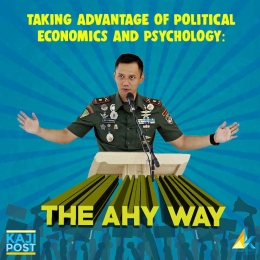Agus and his team seem to make use of the theories to attract public attention really well. One of the most noticeable is the implementation of a psychological aspect called mere exposure effect, wherein continuous exposure to a stimulant increases our familiarity to and penchant for it, thereby increasing public's preference on it.
A primary example is their 'exploitation' of a part of Indonesians who still depict good-looking and dashing individual as an ideal leader. They set up billboards of him displaying comity gesture which really shows his chivalrous image.
Meanwhile, his political compatriots on social media have helped him a lot in framing himself. They continuously communicate Agus' fortes by bringing his accomplishments during military days into view, showing the results of various surveys in which he often led, and so forth.
In addition, they also deploy a concept named transference, whereby someone unconsciously redirects his/her feelings from one person to another when the latter's character resembles that of the former.
In this case, AHY's father's background as an ex-president with numerous achievements is transferred to him, thereby making the capabilities and qualities of his father seemingly become his too. In short, those being fond of his father will redirect their admiration towards him, giving him some sort of mileage out of his father's renowned reputation.
He also utilises people's pessimistic bias (wherein people tend to exaggerate current economic condition) by criticising economic policies undertaken by the reigning government, including the low level of purchasing power, the rise of electricity base tariff rate, low employment, and the influx of foreign workers.
In the meantime, his team, especially in social media, tries to portray the past as felicitous and present time as promiscuous by echoing President Susilo Bambang's attainments during his presidency and contrasting those with the current situation so as to 'reminisce' that good time, thus creating the urge to change the circumstances among his proponents.
By doing this, he is not so much really criticising the policies as trying to position himself with those who believe that economy is doing poorly with hope to gain their supports whilst also strengthening the supports from his established proponents. Be that as it may, this sort of approach has inherent problems and implications worth concerning.
Concerns and challenges of this sort of approach
According to Roy Baumeister and Kathleen Voss (2007), people as human beings already have values that root firmly and tend to cling to it throughout their life.[4]
It is known as belief perseverance, a view stating that people maintain their belief despite new information coming in from outside contradicting their judgment. It means that people generally tend to stay put when it comes to changing values or even get more certain on their beliefs when challenged. It is likely that Agus' case is no exception.








